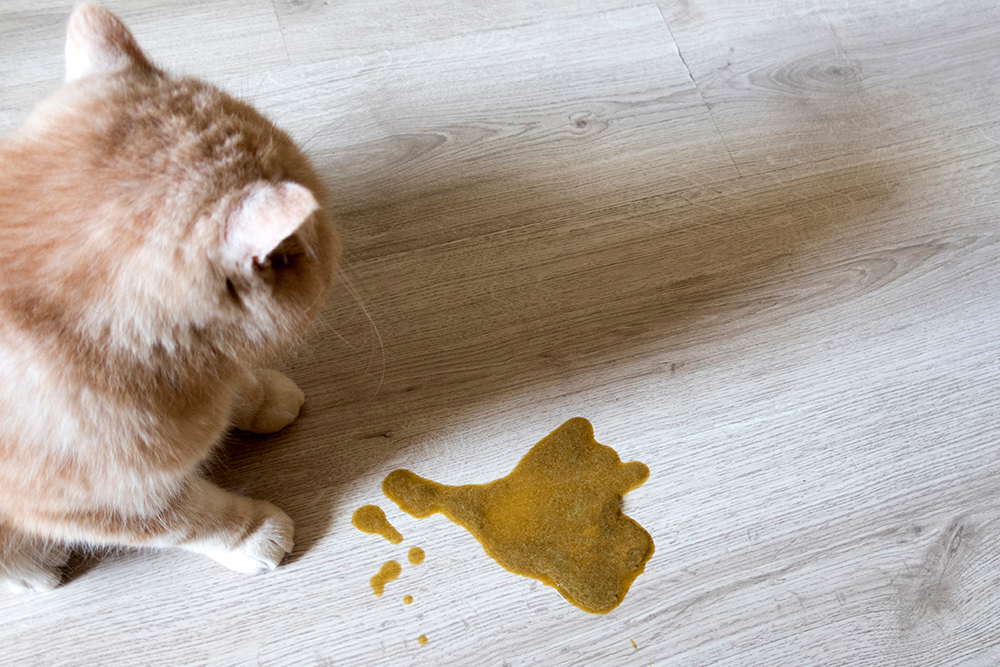Vomiting in cats is a common occurrence that can happen for many reasons. While an occasional episode may be nothing to worry about, frequent or persistent vomiting can signal a deeper health concern.
Understanding what causes vomiting, recognizing when it’s serious, and knowing how your vet can help are key to keeping your feline companion healthy and comfortable. Here’s what every cat owner should know.
Why Do Cats Vomit?
Occasional vomiting can be normal in cats, especially when caused by minor digestive issues, hairballs, or dietary indiscretions. But when vomiting becomes frequent or chronic, it could be due to something more serious.
Common causes of vomiting in cats include:
- Hairballs
- Eating too quickly
- Food allergies or dietary intolerance
- Gastrointestinal blockages
- Infections or parasites
- Chronic kidney disease
- Hyperthyroidism
- Inflammatory bowel disease (IBD)
Learn more about Feline Vomiting – Cornell Feline Health Center
Understanding the Different Types of Vomiting
Acute vs. Chronic Vomiting
- Acute Vomiting: Sudden and short-lived, often caused by eating something unusual, infections, or toxins.
- Chronic Vomiting: Ongoing over weeks or months, usually associated with conditions like kidney disease, IBD, or hyperthyroidism.
Identifying the Type of Vomit
- Hairballs: Common in long-haired cats, but frequent hairballs may indicate a grooming or GI issue.
- Undigested Food: Could be a sign of eating too fast or a food intolerance.
- Yellow Bile or Foam: May suggest empty stomach or acid buildup.
- Bloody Vomit: Can indicate ulcers, toxins, or trauma—requires urgent care.
- Mucus or Watery Vomit: May point to infections or systemic illness.
Explore more about Types of Cat Vomit – Purina
Common Causes of Vomiting in Cats
Dietary Issues
- Eating too fast
- Sudden change in diet
- Food intolerance or allergies
Hairballs and Gastrointestinal Blockages
While occasional hairballs are expected, frequent vomiting or attempts to vomit without success could signal a blockage. Swallowed string, toys, or bones can be life-threatening.
Signs of obstruction:
- Repeated vomiting
- Lethargy
- Loss of appetite
- Straining to defecate
- Abdominal pain
Read more about Gastrointestinal Foreign Bodies – ACVS
Underlying Medical Conditions
- Chronic Kidney Disease (CKD): Often seen in older cats. Symptoms include vomiting, weight loss, and increased thirst.
- Hyperthyroidism: Affects metabolism; causes vomiting, hyperactivity, and weight loss.
- IBD: Leads to inflammation in the GI tract, causing chronic vomiting and diarrhea.
When to Call the Vet: Signs of an Emergency
Contact your veterinarian if your cat shows:
- Vomiting multiple times in a day or over more than 24 hours
- Signs of dehydration (dry gums, sunken eyes)
- Blood in the vomit (bright red or coffee-ground appearance)
- Hunched posture or crying from abdominal pain
- Refusal to eat or rapid weight loss
How Vets Diagnose and Treat Vomiting
Diagnostic Tests May Include:
- Physical exam
- Bloodwork and urinalysis
- X-rays or ultrasound
- Fecal exam for parasites
Explore more about Exploratory Surgery in Pets – PetCoach
Treatment Options Vary Depending on the Cause:
- Dietary Changes: Slow feeders, hypoallergenic diets, or novel protein food trials
- Hairball Remedies: Regular brushing, hairball-control diets, or mild laxatives
- Parasite Treatment: Dewormers and probiotics
- Medical Management: For chronic conditions like CKD or IBD
- Surgery: Required for foreign body removal or tumors
Read more about Gastrointestinal Obstructions – Cornell Vet
Preventing Vomiting in Cats
While not all vomiting can be prevented, many cases are manageable with simple lifestyle changes:
Feed Small, Frequent Meals
Frequent small meals are easier to digest and help reduce vomiting from overeating or acid buildup. For cats who eat too quickly, try a slow-feed bowl or puzzle feeder.
Control Hairballs
- Brush your cat regularly, especially if long-haired
- Try hairball diets or over-the-counter remedies recommended by your vet
Avoid Sudden Diet Changes
Transition new foods gradually over 7–10 days to avoid stomach upset.
Keep Dangerous Objects Out of Reach
Cats love to explore. Keep string, plants, rubber bands, yarn, and other small objects out of reach to prevent accidental ingestion.
Maintain Regular Vet Checkups
Annual (or biannual for seniors) exams with routine bloodwork and parasite screening are essential for early disease detection and prevention. See A Watchful Eye: Recognizing Senior Pet Health Problems – AAHA for more information.
When in Doubt, Talk to Your Vet
Vomiting in cats can range from harmless to serious. If your cat is vomiting frequently or showing additional symptoms like lethargy, weight loss, or pain—don’t wait. Prompt veterinary care can make all the difference.
Contact North Waterloo Veterinary Hospital to schedule an appointment and get your cat the care they need.








Leave A Comment